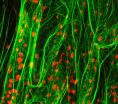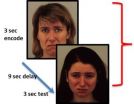Gene variants found to affect human lifespan
CHOP researchers compared young to old populations, identified CNVs conferring long-term risk or protection
2013-02-05
(Press-News.org) By broadly comparing the DNA of children to that of elderly people, gene researchers have identified gene variants that influence lifespan, either by raising disease risk or by providing protection from disease.
"This research is the first genome-wide, population-based study of copy number variations in children associated with human longevity," said study leader Hakon Hakonarson, M.D., Ph.D., director of the Center for Applied Genomics at The Children's Hospital of Philadelphia.
The study appeared Jan. 30 in the open-access journal PLOS ONE.
Copy number variations (CNVs) are losses or gains in DNA sequence that are usually rare, but which often play an important role in raising or lowering the risk of disease.
The study team compared the rates of CNVs in a sample of 7,313 young subjects, 18 years old and below, from the Children's Hospital network, to a group of 2,701 Icelandic subjects, 67 years old or above, recruited by the Icelandic Heart Association. The researchers used microchip arrays to perform the whole-genome CNV analyses.
"Our assumption was that CNVs appearing in children but not in the elderly were more likely to be disease-causing, while CNVs that were proportionately higher in older people were more likely to be protective, allowing them to live longer," said Hakonarson.
After performing a replication study in an independent U.S. cohort of 2,079 children and 4,692 older people and making statistical adjustments to address population stratification, the study team found seven significant CNVs. Three of the CNVs were deletions of DNA sequence, while four were duplications.
The genes impacted by the CNVs were disproportionately involved in alternative splicing. This is an important biological mechanism in which, instead of one gene simply expressing one protein, modifications to messenger RNA result in different protein products based on the same underlying DNA code in a given gene.
"Our results suggest that CNVs and other genetic variants may exert their effects through gene networks and pathways that regulate biological functions through mechanisms such as alternative splicing," said Hakonarson. "Possibly in a more global way than previously thought, some of these CNVs may have favorable effects, whereas others are bad for you and predispose you to diseases."
Although much work remains to be done, he added that the CNVs overrepresented in children may represent novel targets implicated in short lifespan. Eventually, added Hakonarson, if such CNVs are incorporated into early clinical screening tests, their presence could be prognostic markers indicating which patients should take individualized preventive health measures.
INFORMATION:
An Institutional Development Award from The Children's Hospital of Philadelphia supported this research, along with the Cotswold Foundation. Other funding sources for databases used in this study included the National Institutes of Health and the Icelandic Heart Association.
"Copy Number Variations in Alternative Splicing Gene Networks Impact Lifespan," PLOS ONE, published online Jan. 30, 2013.
http://dx.doi.org/10.1371/journal.pone.0053846
About The Children's Hospital of Philadelphia: The Children's Hospital of Philadelphia was founded in 1855 as the nation's first pediatric hospital. Through its long-standing commitment to providing exceptional patient care, training new generations of pediatric healthcare professionals and pioneering major research initiatives, Children's Hospital has fostered many discoveries that have benefited children worldwide. Its pediatric research program is among the largest in the country, ranking third in National Institutes of Health funding. In addition, its unique family-centered care and public service programs have brought the 516-bed hospital recognition as a leading advocate for children and adolescents. For more information, visit http://www.chop.edu
END
ELSE PRESS RELEASES FROM THIS DATE:
2013-02-05
New York City experienced a historic decline in crime rates during the 1990s, but it was not due to the implementation of CompStat or enhanced enforcement of misdemeanor offenses, according to an analysis by New York University sociologist David Greenberg. The study, which appears in the journal Justice Quarterly, did not find a link between arrests on misdemeanor charges and drops in felonies, such as homicides, robberies, and assaults. In addition, the analysis revealed no significant drop in violent or property crime attributable to the NYPD's introduction of CompStat ...
2013-02-05
Gravity affects the ecology and evolution of every living organism. In plants, the general response to gravity is well known: their roots respond positively, growing down, into the soil, and their stems respond negatively, growing upward, to reach the sunlight. But how do plants sense gravity and how do they direct or signal their cells to grow in response to it? Although botanists understand a great deal about how this works, a recent article in the recent issue of the American Journal of Botany reviews what we know so far, from mechanical to genetic approaches; it reveals ...
2013-02-05
CAMBRIDGE, MA -- A typical cancer cell has thousands of mutations scattered throughout its genome and hundreds of mutated genes. However, only a handful of those genes, known as drivers, are responsible for cancerous traits such as uncontrolled growth. Cancer biologists have largely ignored the other mutations, believing they had little or no impact on cancer progression.
But a new study from MIT, Harvard University, the Broad Institute and Brigham and Women's Hospital reveals, for the first time, that these so-called passenger mutations are not just along for the ride. ...
2013-02-05
ANN ARBOR—Women in developed countries survive roughly 10 years longer after a breast cancer diagnosis compared to women in poor-to-middle-income countries, a new University of Michigan study suggests.
The report demonstrates the lack of access to good health care faced by women in poor countries, said the study's principal investigator Rajesh Balkrishnan, an associate professor at the U-M schools of Pharmacy and Public Health.
Early diagnosis and sustained treatment were the biggest hurdles and also the main indicators of patient survival, he said.
Balkrishnan and ...
2013-02-05
VIDEO:
NIMH's Dr. Maura Furey talks about how a functional brain imaging measure may help predict a patient's response to a rapid-acting experimental antidepressant.
Click here for more information.
A telltale boost of activity at the back of the brain while processing emotional information predicted whether depressed patients would respond to an experimental rapid-acting antidepressant, a National Institutes of Health study has found.
"We have discovered a potential ...
2013-02-05
Healthy eating not only promotes growth and development, but also provides important opportunities for children to socialize during meals. A new, comprehensive analysis of feeding behavior in children with autism spectrum disorders (ASD) indicates that these children are five times more likely to have a feeding problem, including extreme tantrums during meals, severe food selectivity and ritualistic mealtime behaviors.
Researchers at Marcus Autism Center and the Department of Pediatrics at Emory University School of Medicine conducted a comprehensive meta-analysis of ...
2013-02-05
A new NOAA research report finds that both fish populations and commercial and recreational anglers have benefited from "no-take" protections in the Tortugas Ecological Reserve in the Florida Keys National Marine Sanctuary.
The report, "An Integrated Biogeographic Assessment of Reef Fish Populations and Fisheries in Dry Tortugas: Effects of No-take Reserves," is the first to evaluate how the 151-square nautical mile Tortugas Ecological Reserve affects the living marine resources of the region and the people whose livelihoods are connected to them.
The report's analysis ...
2013-02-05
Boston, MA – Having adequate levels of vitamin D during young adulthood may reduce the risk of adult-onset type 1 diabetes by as much as 50%, according to researchers at Harvard School of Public Health (HSPH). The findings, if confirmed in future studies, could lead to a role for vitamin D supplementation in preventing this serious autoimmune disease in adults. The study was published online February 3, 2013 and will appear in the March 1 print edition of the American Journal of Epidemiology.
"It is surprising that a serious disease such as type 1 diabetes could perhaps ...
2013-02-05
According to a new technical report, the effects of climate change will continue to threaten the health and vitality of U.S. coastal communities' social, economic and natural systems. The report, Coastal Impacts, Adaptation, and Vulnerabilities: a technical input to the 2013 National Climate Assessment, authored by leading scientists and experts, emphasizes the need for increased coordination and planning to ensure U.S. coastal communities are resilient against the effects of climate change.
The recently-released report examines and describes climate change impacts on ...
2013-02-05
LA JOLLA, CA – February 4, 2013 – A team led by scientists at The Scripps Research Institute (TSRI) has identified specific cellular events that appear key to lupus, a debilitating autoimmune disease that afflicts tens of millions of people worldwide. The findings suggest that blocking this pathway in lupus-triggering cells could be a potent weapon against the disease.
In the new study, described in an online Early Edition of the Proceedings of the National Academy of Sciences the week of February 4, 2013, the researchers determined that the absence of a certain type ...
LAST 30 PRESS RELEASES:
[Press-News.org] Gene variants found to affect human lifespan
CHOP researchers compared young to old populations, identified CNVs conferring long-term risk or protection


